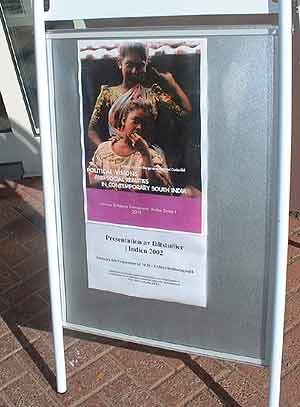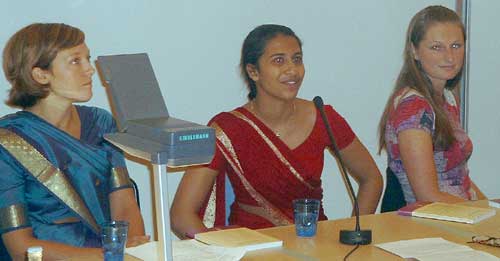SWEDISH SOUTH ASIAN STUDIES NETWORK
South India Field Study Project |
|
 Book
project on Indian History and Religion at Falun
Book
project on Indian History and Religion at Falun
”Political Visions and Social Realities in Contemporary South India”
is the title of a book edited by Lars Berge and Gunnel Cederlöf,
published by Högskolan Dalarna in September 2003. It is the first
volume in the university’s new International Studies Series, and
consists of papers by seven students at the C- and D-level in History
and Religious studies at Högskolan Dalarna, Campus Falun, who made
a field study tour to South India in the Spring 2002. The project, called
South India Field Study Project, was partly funded by a SASNET
planning grant.
More information on the South
India Field Study Project!
The book, edited by Lars Berge, from the Dept of History, Dalarna University, Campus Falun, and Gunnel Cederlöf, historian at Uppsala University, was presented at a seminar, open to the public, at Högskolan Dalarna, Campus Falun, on Friday 5 September 2003, 10.30–13.
CONTENTS:
• Preface and introduction by GUNNEL CEDERLÖF and LARS BERGE
• Chapter 1: EMMA SANDBERG: Being a Dalit Woman in Seethaikurichy: Religious Affiliations and Social Situations
• Chapter 2: NIKLAS S. SVENSSON: The Hierarchy of the Oppressed: Caste, ”Class” and Social Status in a Rural Christian Protestant Congregation in Tamil Nadu
• Chapter 3: MARIA HANSSON: Can Money Buy Economic and Social Freedom? Micro Credit and the Empowerment of Women in a Self Help Group, Tiruppattur, South India
• Chapter 4: KAVITHA KARLSSON: The Spread of the Gender Concept: The Understanding of the Concept of Gender at a Theological College in South India
• Chapter 5: AGGI BUSIAKIEWICZ: History Education as a Political Tool: The Debate on the Indian Government’s Politics on Education and its Reflection in Bangalore Schools
• Chapter 6: MATTIAS HALLGREN: Student Struggles in the Wake of Hindutva Politics: A study of Two Student Organisations in Kerala
• Chapter 7: PER-GUNNAR GUNNARSSON: Sathya Sai Baba in the Shadow of Hindu Nationalism: A Study of a Guru Movement Philosophy in Comparison with Vishwa Hindu Parishad Ideology
 |
Maria Hansson, Kavitha Karlsson and Aggi Busakiewicz, three of the students involved in the South India Field Study Project, at the seminar, presenting the book, at Högskolan Dalarna, Campus Falun, on Friday 5 September 2003 |
Background to the South India Field Study Project
(Text from the Preface to the book)
The South India Field Study Project, though integrated into the
undergraduate programme of the History department at the Dalarna University
in Falun, Sweden, is different from other similar programmes organised
by educational institutions in the West since, from the outset, it is
the result of a student initiative. The project has been supervised by
the historians Lars Berge, Dalarna University,
and Gunnel Cederlöf, Uppsala University.
During the first term, from early September 2001 to mid-January 2002,
seven students of history and religious studies have been involved in
course-work. This included background reading on modern South Asian history,
ethnographic theory and method, and studies in contemporary social, religious
and political conditions of South India. During this preparatory term,
the students were encouraged to identify the specific aspect of the over-all
theme of the field study, which she or he wanted to explore further.
Seminars with invited specialists
For this purpose, the students met regularly in a reading-circle and in weekly seminars, sometimes with invited specialists, both at the Dalarna University and, in cooperation with Gunnel Cederlöf and the anthropologist Beppe Karlsson at the Dept of Cultural Anthropology and Ethnology at Uppsala University. The seminars in Uppsala have specifically focused methods of fieldwork in the Indian environment. The students have further benefited from introductory lectures and fruitful comments on their respective topics by the environmental economist Lawrence Surendra who is associated with the National Law School of India University in Bangalore.
In Falun, thought provoking seminars on contemporary Indian
film were arranged by Senior Lecturer Mary Ann Edelstam
of the English department, Dalarna University. These discussions contributed
to broaden the understanding of culture and the many perspectives of interpreting
Indian society and life.
The actual fieldwork in south India took place from early February to
early April 2002. It was introduced by a one-week programme in cooperation
with the Madras Christian College (MCC) in Chennai. Lectures were given
by members of the MCC staff and invited specialists on relevant topics,
such as modern Indian political history, dalit and women’s situation,
natural history and biology, and theory of history. Insightful contributions
were made, among others, by M.S.S. Pandian,
S. Anandhi, R. Sridhar,
and V. K. Padmanabhan who participated in
both lectures and seminars where the students presented their work and
forthcoming field-studies. The successful outcome of the field-study project
was to a large degree due to the outstanding reception and generous guidance
that the professors P. Dayanandan and D.
Narasimhan as well as the able and interested MA students of the
Botany Department gave to our students.
Eight weeks of fieldwork
After the introductory week in Chennai, the students went to their respective areas for six to eight weeks of fieldwork. For most of them, this was their first encounter with India. Everyone would probably agree that the experience obtained in the first week in the field often went beyond the mere educational experience: impressions are sometimes overwhelming and the experience becomes a cultural journey and a way to learn more about oneself. The reunion in Bangalore, half-way through the fieldwork period, was a meeting point for sharing many different experiences: from the pastoral and rural areas of Tiruppattur, the politically self-conscious and militant student activists at the Kerala universities, the silence and prayer at the guru Sathya Sai Baba’s ashram in Puttaparthi or the bustling city of Bangalore. Born in India but raised in Sweden by Swedish parents, Kavitha Karlsson’s field study experiences are most illustrative of the complexities that may be involved in encounters between cultures and between men and women. In her article on Women’s Studies at a theological college, she writes:
Since almost 90 per cent of the students [...] are men, I, as an Indian woman, encountered some difficulties regarding my role among these men. When interviewing Indian women, it is more of a meeting between two cultures since I grew up in Sweden. But some men seemed uncertain about my role there since all barriers between Indian men and women seemed to be automatically present in these meetings. With some of the informants, it therefore took several weeks to convince them that I was there to interview them as a Swedish student - not as an Indian woman. I got the advice to dress in Western clothes sometimes, which probably helped. The effect of this for the present study must not, however, be exaggerated, but it is important to be aware of the barriers between a young, Indian woman and an Indian man [...] especially when the issue at stake is gender related questions.
Based on the students BA Honours theses
Back in Falun again, the students spent the remainder of the spring term and the summer vacation writing their theses, which, on their completion, were discussed and examined in the BA Honours seminars at the departments of History and Religious Studies respectively during the autumn semester of 2002. The articles of the present volume are all based on the students’ more extensive theses which, during spring term 2003, have been shortened and re-written into articles in English and proof read by Dr. Jonathan White of the English department, Dalarna University.
The accomplishment of the Dalarna University 2001/2002 South India Field Study Project and the publication of the present book would not have been possible without the generous financial donations of the Swedish International Development Agency and its Minor Field Studies Programme, the Swedish Missionary Council, the Swedish South Asian Studies Network as well as the facilities provided by the Dalarna University.
SASNET - Swedish South Asian Studies Network/Lund
University
Address: Scheelevägen 15 D, SE-223 70 Lund, Sweden
Phone: +46 46 222 73 40
Webmaster: Lars Eklund
Last updated
2006-01-27
